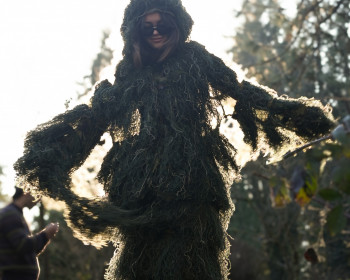From research to real world
Open gallery

Who knew Abbot and Costello could inspire an award-winning research paper? The freedom to think creatively and explore your passions—even for classic comedy—is a hallmark of the Lewis & Clark student experience.
For Sara Miller ’14, a native of Madison, Wisconsin, a Lewis & Clark education means many things: supportive faculty and rigorous academics alongside globe-trotting friends, unmatched natural surroundings, and a work-study position welcoming students and families into our community. In her responses below, the Hispanic studies and sociology and anthropology double major reflects on her diverse experiences, all of which will help her transition from research right into the real world.
How did you choose Lewis & Clark?
I chose Lewis & Clark for a couple of reasons. It was extremely important to me to have a school that would not only allow me to study abroad but encourage it and make it possible no matter what I studied. The location also made me fall in love with this school. Lewis & Clark is near Mt. Hood, and you can ski there for PE credit! More than anything, the reason I chose Lewis & Clark was the feeling on campus: this is such a laid-back and beautiful place to live. I can learn here in an environment that is non-competitive but very focused.
How do your classes prepare you for the future?
Something that I love about Lewis & Clark is that classes don’t stay in the classroom. For my sociology and anthropology research methods class, we are conducting real research for organizations in Portland. I have friends in biology and ecology classes who spend time in Tryon Creek State Park experimenting with ivy. My education here feels applicable to the real world because much of it takes place in, or deals directly with, the real world.
Beyond the emphasis on studying abroad, how has your Lewis & Clark education contributed to you seeing yourself as a citizen in a global community?
A huge part of my experience is living in Akin, the multicultural hall. Living there has introduced me to so many people from so many places and backgrounds. My friends are literally from all over the world. I have learned so much about other cultures and how to live with people from backgrounds so different from my own.
What other Lewis & Clark experiences will stay with you?
A big thing I do here is work for the admissions office. I love being a tour guide and getting to meet prospective students. It’s great work experience, and it always reminds me why I love it here.
In the spring, you won Watzek Library’s research award for first-year students. Tell us about your paper and how you chose the topic.
I was tired of writing papers about “notable” and “high-quality” works—I really wanted to study something fun. Growing up I always loved Abbott and Costello, so I looked up which of their films took place overseas. After watching the film, I knew I wanted to talk about race. The paper is called “Jim Crow and Cannibals: Race in Africa Screams.” It is about Abbott and Costello’s Africa Screams, and how it portrays the American stance on race both at home and abroad directly following World War II. The whole project just sort of developed naturally.
How does student-faculty collaboration impact your education?
My professors have always been very supportive, whether they’re meeting with me for the fourth time to talk about a paper or helping me find the right person to talk to. My Exploration and Discovery professor Maureen Reed really went the extra mile with encouraging me to apply for the Watzek award. I wouldn’t have applied if not for her urging, and I won the award! This is the kind of support Lewis & Clark professors give.
More Newsroom Stories
Public Relations is located in McAfee on the Undergraduate Campus.
MSC: 19
email public@lclark.edu
voice 503-768-7970
Public Relations
Lewis & Clark
615 S. Palatine Hill Road MSC 19
Portland OR 97219

